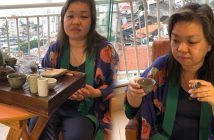Have you ever wondered about the difference between Black teas and Green Teas? Or are you an avid tea drinker and want to add to your chest of tea-related knowledge. Read about how these two delectable tea types are different and in what way!
From casual conversations at parties to tea-tasting workshops, this is among the top of the frequently asked questions to me : what is the difference between Black Tea and Green tea. And every time I answer it, it has a magical effect – as if I have cast a spell! People flock around, eager and excited, attentive and amazed as I unravel the mystery of this mystical beverage we all know as ‘tea’.
As a tea master, let me take you on a humble tea leaf’s chrysalis journey that transforms it into a strong, bold cup of Assam black tea or delicate green tea from the Nilgiris, all in a matter of just 24 hours! Let’s take a look!
BLACK & GREEN TEA BOTH COME FROM THE SAME PLANT
Many a times people assume that Black and Green teas, because of the difference in their taste, color and experience, come from different plants. But that isn’t true!
Both black and green tea come from the same plant – Camellia Sinensis, the scientific name of all tea bushes across the world. After they are harvested (actually, plucked), they go through different processing stages, one of which is Oxidation.
It is Oxidation that is responsible for the tea to transform into black tea or green tea.
OXIDATION OF TEA LEAVES
Time for a crash-course in Chemistry! The process of ‘Oxidation’ happens with when food reacts with oxygen in the air. It is due to oxidation that a peeled banana or a cut apple starts turning black. This exact process also happens with tea leaves.
When loose leaf tea is allowed to oxidise in controlled conditions, the biochemical compounds in the tea leaves are exposed to oxygen in the air. Thereby takes place a complex reaction which makes the tea leaves change their appearance from green to black (actually, it is a dark shade of copper).
After the leaves attain an optimal level of oxidation, they are passed through a long, flat conveyor at a high temperature. This is called Firing or Drying, and is similar to baking (imagine loaves being baked inside an oven). Firing stops the oxidization process, reducing moisture to around 3-4%. When the tea emerges after firing, it becomes the familiar black tea we know.
So, it is the phenomenon of oxidation what makes a tea black. Not a whole other plant.
HOW DOES THE SAME PLANT BECOME GREEN TEA ?
Wondering how loose leaf Green tea is made? Ok let’s take a look at how the same plant becomes a delicious, nourishing cup of green tea.
Whilst making green tea, the oxidation process is completely bypassed. In other words, green tea is what you get when the tea leaves are not allowed to react with the oxygen in air, and hence, retain their bright green color!
The tea leaves, after being plucked, undergo a quick heat treatment to destroy the tea enzyme. In Japan, this is done by steaming the tea leaves, while in China, tea leaves are pan fried. A reason why one can find so many different variations of green tea, from all around the world. For example – one of the varieties of powdered Green Tea, known as Matcha green tea, is nurtured, harvested and processed in a unique way.
After heat treatment, the tea leaves are semi-dried and rolled – either by hand or in rollers. They then undergo firing to remove excess moisture, and are then graded, sorted and packed.
The only difference between black tea and green tea, therefore, is the oxidation process. Rather the presence or absence of this process.
SO TO RECAP
- Both black tea and green tea come from the same plant – Camellia Sinensis
- It is the oxidation process that turns the same tea leaf into black tea or green tea
You can check out our impressive collection of Black teas, sourced from prime tea growing regions in India like Darjeeling and Assam. From signature single-estate black teas and our expertly curated blended black teas to curate our bestsellers.
We also have delectable and exclusive varieties of Green teas, sourced from Darjeeling, Nilgiris in Southern India, and Kangra from North India. The terroir of these tea producing regions contribute to the cup’s characteristics and you get a unique experience with every single blend. Our blenders have combined these garden-fresh green teas with bountiful florals, herbs and spices to bring you an impressive range of deeply nourishing green teas.



